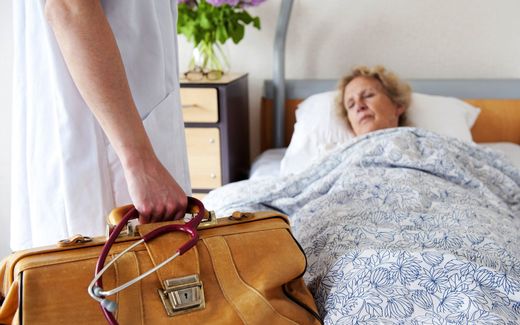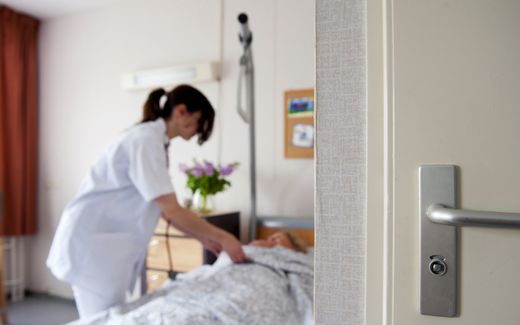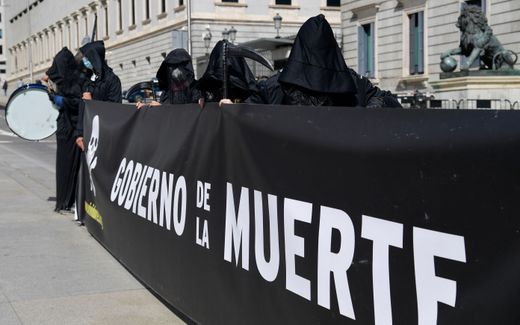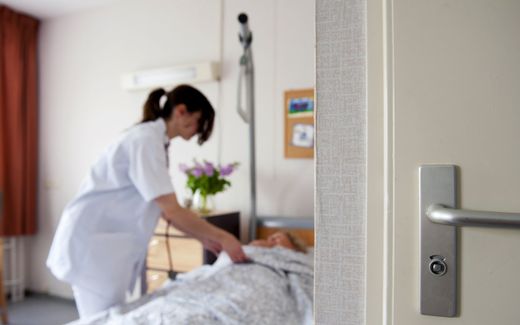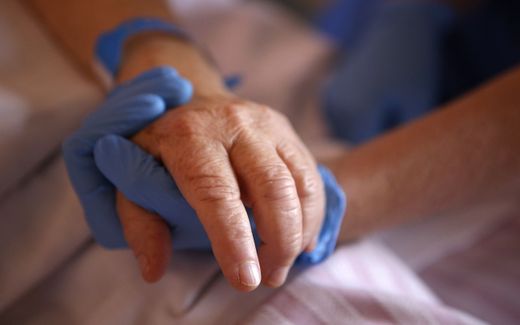For Bert, working in a hospice is indispensable
16-05-2023
Western Europe
Arco Vuik, RD
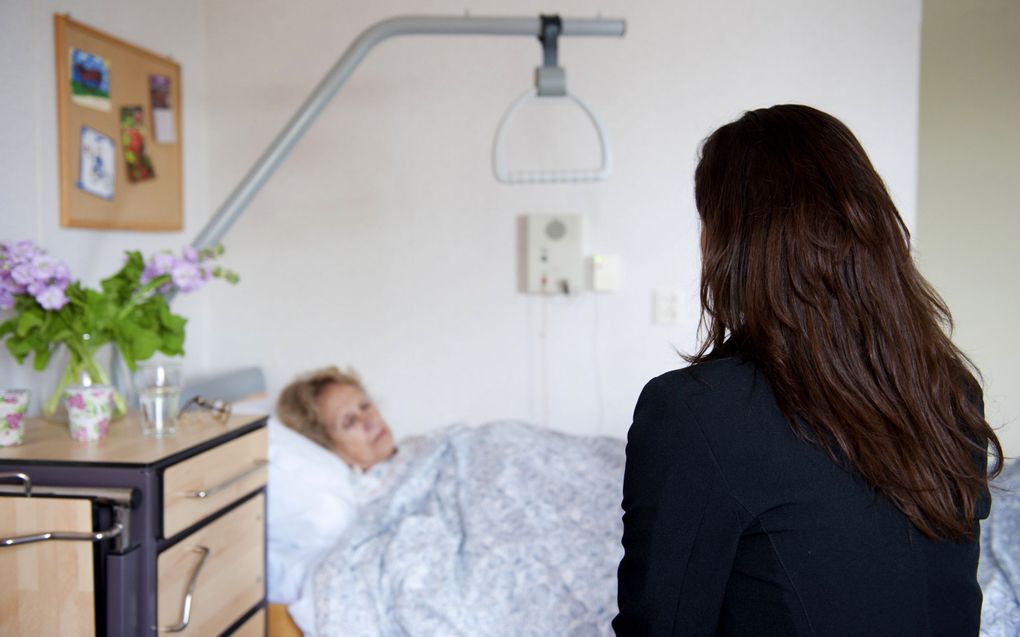
The number of volunteers helping people during the final phase of their lives increased in the Netherlands last year. Photo ANP, Roos Koole
Western Europe
Thousands of people choose to volunteer in palliative care. And that number is rising. What motivates them, and what do they experience? Two personal stories from the Netherlands.

Volunteering in a hospice is not for me, Bert van Egmond (64) thought. He now experiences the Elim hospice as an oasis where the outside world slips away from him.
"I could never do it. It seems tough to care for people who die so quickly." Van Egmond says to get this reaction quite often when he talks about his volunteer work at Elim hospice in Moerkapelle.
At first, the flower grower wonders if it is something for him. A year ago, he stepped down as office-bearer in the Reformed Church in his hometown of Bleiswijk and decided to volunteer. By then, his wife had been helping at the Elim hospice.
"She persuaded me to take part in a shift. I might have become a debt relief buddy if it had been up to me. I was not used to helping people who needed physical care. But I started to appreciate visiting Elim."
Every day, two volunteers are present from 7 am to 11 pm at the small-scale hospice, which can accommodate up to four people. A shift lasts four hours, so eight volunteers are needed per day. Van Egmond does the volunteer work together with his wife. "I rotate one shift a week because I also still have my business," he says.
The volunteers offer a helping hand to the home care workers who do the medical nursing of the residents. "For example, I don't interfere with administering medicines," he says. The home care staff sometimes also work elsewhere in Moerkapelle and are therefore not always present at the hospice. "In case of emergency, if a resident's condition deteriorates quickly, for example, they are called in and are present within 10 minutes."
Mission
The main task of a volunteer in the Elim hospice is to unburden residents and their relatives, says Van Egmond. "We are here to listen to them. We make a cup of coffee for visitors. When family members leave again, we show that their loved one is looked after when they are not there."

Van Egmond feels great appreciation for the work he does in Elim. "We often hear from family members that it is fantastic how residents are cared for. They also praise the atmosphere in the hospice. It's cosy here. I think it's nice to make a small contribution to that."
According to doctors ' estimates, terminal people have only three months to live. "They don't have to do anything anymore and can expect us to do everything for them. As a volunteer, I can be of service. That is a beautiful Christian mission."
Desire
Van Egmond sits by residents' bedsides during a shift. He briefly holds their hand or dabs their forehead or lips with a flannel. He sometimes experiences that a dying person, half awake and half asleep, notices: there is someone at my bedside; I am not alone.
"Regularly, I listen to residents who still want to bear witness to their faith," he says. In them, the volunteer quite often notices a longing for the end. "They often like it when I read from the Bible with them or do a prayer. They usually no longer have the energy for that themselves. Those are moments when you talk to each other about taking refuge with Jesus, especially in need and difficulty."
People who have nothing to do with faith are also welcome in Elim. "To them, I may show something of Christian mercy, although I do not evangelise."
Young people being admitted to the hospice is something Van Egmond finds intense. People aged forty or fifty are sometimes fathers or mothers with young children. "That is difficult. Fortunately, I do this together with my wife. We can share our experiences, and we support each other." He also sees loneliness. Residents who have a small network and receive few visitors. "Especially for them, I can mean something."
Guidance
Volunteers in Elim receive the necessary guidance from two coordinators. This includes an introductory course of six evenings on the ins and outs of the hospice, about what does and does not belong to the task package of a volunteer. They also receive information on the course of the dying phase and what it means to be terminal. The hospice also offers follow-up courses, for example, on dealing with grief and mourning.
Some 100 volunteers are involved in the hospice in the western part of the Netherlands. "We form a close-knit team. Everyone has the same goal in mind. Cooperation with the home care staff also goes well. They provide loving care but are very busy. We can give extra time and attention to the residents. In this way, we complement each other."
Van Egmond doesn't want to miss volunteering anymore. "My daily work is in the greenhouse, but when I come to the hospice, it's like the outside world slips away from me. I'm in a different world there, and it's not oppressive."
The number of volunteers helping people during the final phase of their lives increased in the Netherlands last year. According to the association Volunteers Palliative Care (VPTZ Nederland), just over 13,000 volunteers assisted these people and their loved ones. That is a few hundreds more than the year before.
The spokeswoman for VPTZ Nederland says palliative terminal care is and remains popular among volunteers. According to her, they like to dedicate themselves to people in the last phase of life because this situation affects them, and they want to be close to people who have only days, weeks or months to live. "Volunteers also support loved ones so the carer has some respite."
Over the past 20 years, the number of volunteers at VPTZ Nederland has almost tripled, reports director Carla Aalderink in the 2022 annual report. "With all the challenges we face as a society in the coming years, such as the double ageing population and increasing staff shortages, the use of volunteers and social initiatives becomes even more important. We are therefore pleased that the number of organisations experiencing a shortage of volunteers has decreased significantly this year."

Marleen Rameckers' (47) work disappears at the start of the corona pandemic. She starts a cleaning job at the Kuria hospice in Amsterdam. Now, she is a care volunteer and would not want to miss Kuria.
"I wanted to make myself useful and not sit at home frustrated," Rameckers says. The Amsterdam native, mother of four, is an entrepreneur in children's clothing and baby care products. When her work declined badly in 2020, she chose to volunteer. "In our church, there were quite a few volunteers from Kuria, including many retired people. They quit Kuria en masse for fear of the virus."
Rameckers can start working at Kuria as a cleaner. The hospice had to be disinfected four times a day during that period. "That gave me an insight into life there."
Step by step, the 40-year-old starts doing more and more tasks at the hospice. She is increasingly crossing the threshold with residents. "Because I have no care background, I had to overcome quite a bit of nervousness. The last phase of people's lives was quite unfamiliar to me. Sometimes it was overwhelming."
Still, Rameckers cannot stop volunteering, even if her business resumes. She decides to keep doing one volunteer shift a week. The Amsterdam native serves the evening meal, does laundry, and converses with residents. Kuria can accommodate up to 10 residents, and there are nurses on hand who are responsible for medical care. "We also support with care tasks, such as helping residents to bed or the toilet. Putting on pyjamas, brushing teeth, cleaning dentures, you name it."
Win-win
Kuria is a hospice with a Christian identity, but its residents from the Amsterdam region come from diverse backgrounds. "Here I can tell about my Christian faith. That is something unknown to many people here."
Volunteering is something Rameckers was raised with. "My mother was doing a lot of work for others. You unconsciously pass that on to your children. Just as I secretly do to my children. It strikes me that in my secular environment, there is little volunteering. I am sometimes accused of doing it to make myself feel good, but that is not it. Working at Kuria doesn't feel like a sacrifice. I get so many wise lessons from people at the end of their lives. These are experiences I take home with me. It's a win-win situation."
Finished life
The Amsterdam native sees everyone around her is busy with work, children and sports. "I understand that, but seeing the suffering in the hospice puts many things in my own life into perspective. Helping in Kuria broadens my horizon. As my children grow up, more space comes into my life. I can go to work more, play sports or have coffee with friends, but volunteering is also a choice."
Society mainly emphasises achieving great and compelling things, Rameckers argues. "In Kuria, it is more often about the small things that are of value. An 86-year-old woman is enjoying plants in her room or the birds outside. That is a finished life; the outside world might judge. But she thinks: if I die in my sleep tonight, it's okay, but if I wake up tomorrow, it's okay too. She is a great example for me."
Not everyone can accept the end that way. Rameckers cites the example of a 47-year-old man who suffered from a brain tumour. "He went down fighting. Because of his brain tumour, the man made a point of everything. He constantly commented on his children, partner and volunteers. That was incredibly difficult for his family and cast an extra shadow over the loss. I found that very confronting. His loved ones have to live with unpleasant memories of that last stage of life."
Rameckers feels supported by the other volunteers and nurses in coping with such intense experiences. "I never feel that I am alone," she says.
Related Articles

